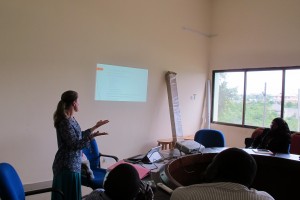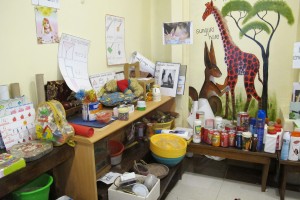Wow, it has been a busy week. One week ago on June 8 I gave a workshop for the education faculty and some outside partners on basics of early childhood curriculum and pedagogy. I also provided additional materials on Universal Design for Learning (UDL) and emergent curriculum.
On the second day (June 9), we did a little bit of the items I had prepared for the workshop, but in fact spent most of the time going over the draft curriculum for the new early childhood program and discussing some of the work I had done on it. One of the community stakeholders in the room was the director of the Madrassa Traning Centre where they have a certificate program to train early childhood teachers. In Tanzania, students can do a 1-2 year certificate program (first level of college if they didn’t do their advanced level work from the British system). After they finish that, they can do a diploma (the program we are developing) if they meet the academic criteria. A diploma is kind of like an Associate’s degree. The hope in the future is to expand and create a bachelor’s and master’s program, but this is the first diploma program on Zanzibar in early childhood education. It is a much anticipated degree program in the community and government.
I had a lot of fun doing the training and having the conversation with all the faculty and stakeholders about what they know and value and what is already happening in the community. For example, there was some disagreement about whether physical education was part of early childhood education and in what ways was it similar or different from play and games. In teaching courses, do we or how do we separate this? Furthermore, looking at the differentiation between play, sport, and games?
We also talked lot about active learning methodologies and implementing practical strategies in all pre-primary schools, including in schools where their mandated curriculum does not encourage play pedagogies. In Zanzibar, there is a mixed delivery system where children at the age of 4 and 5 can attend government schools, private childcare centers (often taught in English), and community-based centers. In addition, madrassas or Islamic religious educational institutions have long been part of the early childhood landscape here, but are both private and community based, depending on the area. It seems to be that madrassas are the most numerous of the early childhood centers, but I should point out that they are not the only place where religion is taught. Because Islam is such a fundamental part of the Zanzibar culture and currently 99% of the population are Muslim, religion is taught in government schools as well. On the mainland of Tanzania, religion is taught in the government schools and some private schools and children choose to participate in Christian or Muslim classes based on their family’s religion.
I can see many wonderful things happening here in the development of the early childhood program and the application of active learning methodologies, using play for learning, and cooperative learning in the college classrooms. Here is a preview of posts to come about classrooms.
Another discussion in the stakeholder meeting with faculty that extended to other conversations later in the week involved the language of instruction in pre-primary classrooms. It seems that in government and madrassa schools, the language of instruction is Kiswahili but children learn English as a subject multiple times a week and in the madrassa they also learn Arabic as a subject. One of the purposes of private schools in Tanzania in general is to offer families a school in English. Theoretically, classes are all in English from the first class whether pre-primary or primary school. But, since English is rarely spoken at home and often not fluently by parents, it is hard for children to start in English exclusively. Only families with the highest levels of education and/or families where parents and children have lived overseas speaking English is fluent or proficient English present. Based on my anecdotal observations, people who have a bachelor’s degree or higher and/or work in levels of influence in the government education office, have stated that English should not be a medium of instruction at this early age and children should focus on learning and content knowledge in Swahili. English can be a subject, but even too much English or Arabic can get confusing for the child. My personal belief is that children should learn in Swahili based on my reading of the research. They can learn other languages later. If they are able to learn them from fluent speakers and practice both to be truly bilingual, that could be different, but that is a very small percentage of families. But, I was told but multiple people that the reason they teach English and Arabic as subjects is because the parents demand it and think their children can learn to speak fluent English when they leave pre-primary.
My colleagues and I plan to do some work and maybe write an article looking at this issue and the research and look for ways to educate parents and the community on best language practices.
This is a really long entry on my thoughts. Upcoming entries may not be in order of events but I will share my visits to early childhood centers, attending a graduation, a concert, and another super fun beach trip with my colleagues from the school of education. I will leave you with gratuitous photos of the sunset and water because I love it.





Simply amazing article! I also can share my experience in filling forms. By the way, if anyone is facing a problem of filling a form, I’ve found a template here http://pdf.ac/5bzDU7. You also can esign the form and fax it.
the integration of 3D body scanning with artificial intelligence and machine learning algorithms has further enhanced its capabilities. These technologies work synergistically to analyze vast amounts of data collected from scans, allowing for predictive modeling, anomaly detection, and the development of more sophisticated applications across various industries. As these technologies continue to evolve, the potential applications of 3D body scanning are poised to expand further, offering new possibilities in fields ranging from anthropology and archaeology to ergonomics and beyond. The future holds immense promise for this transformative technology, continually pushing the boundaries of what’s possible in understanding and utilizing the human form.visbody 3d body scanner
We always follow your beautiful content افضل برنامج محاسبة في السعودية
Electric pruning shears are electric tools used for gardening operations to trim branches and leaves. It is mainly composed of batteries, blades, and the main body. When in use, the upper blade is driven by electric power to move back and forth, while the lower blade is fixed to complete the trimming work. The use of [electric pruning shears](https://hardell.com/collections/electric-pruning-shears) only requires pulling the trigger to complete the pruning of branches.
No question, this content is getting a like. MLS-C01 reliable exam sample questions offers premium content, and it’s free of cost.
Your article was incredibly impactful, thank you for this insight. Reliable EX200 real exam has fantastic resources available to you at no charge.
This is so good, a like is mandatory. I used the Valid braindumps FCP_FMG_AD-7.4 sheet to earn a promotion and salary boost. Now, it’s free for everyone. Best of luck on your career journey!
Your article really made an impression, thank you so much. Here’s the free New study guide OG0-093 ppt material! Best of luck to all!
Your article had such an impact on me, thank you for sharing it. This Sales-Cloud-Consultant reliable study guide ebook helped me achieve career growth with a promotion and salary raise. It’s free now for everyone. Wishing you success!
Your article is fantastic, thank you for sharing this brilliant piece! I owe my success to the Cuttin g-edge JN0-460 resources test, and now I’m giving you access to it for free!
Straight to the like button, this content is fantastic. Good luck! Free New C-S4PPM-2021 learning materials study materials available for you.
Clicking like instantly—this is fantastic. I’m facing the HPE0-V28 test duration exam soon. Hope I pass with ease!
Your article had such a strong effect on me, I’m really thankful. Sharpen your IT abilities with free PHRca pass rate. Wishing you success in your exams!
I appreciate your article deeply, it left a strong impression on me. The Hot C-THR86-2411 spot questions exam questions are free—essential for career advancement and salary increase!
なんで悩んでいるのですか。SAPのC-THR94-2405認定試験にどうやって合格するかということを心配していますか。確かに、C-THR94-2405認定試験に合格することは困難なことです。しかし、あまりにも心配する必要はありません。試験に準備するとき、適当な方法を利用する限り、楽に試験に合格することができないわけではないです。では、どんな方法が効果的な方法なのかわかっていますか。Tech4ExamのC-THR94-2405問題集を使用することが最善の方法の一つです。Tech4Examは今まで数え切れないIT認定試験の受験者を助けて、皆さんから高い評判をもらいました。この問題集はあなたの試験の一発合格を保証することができますから、安心に利用してください。
This article gave me new perspectives, thank you for sharing! Here’s the C1000-173 exam vce format exam that helped me secure a promotion and raise, and it’s free today for everyone. Wishing you success in your career path!
This article is so encouraging, thanks for sharing it! I’m sharing the Valid dumps DA0-001 pdf questions that made my promotion and raise possible—get them for free!
Your article is outstanding; thank you for sharing it! Get the 1Z0-771 trustworthy exam content exam questions for free—wishing you all the best in your exams!
PHRiテスト教材は、主に3つの学習モード(Pdf、オンライン、ソフトウェア)をそれぞれ使用します。その中でも、ソフトウェアモデルはコンピューターユーザー向けに設計されており、ユーザーがWindowsインターフェイスを使用して学習のPHRiテスト準備を開くことができます。ユーザーが読むのに便利です。 PHRiテスト教材には、オンライン学習プラットフォームとは異なる最大の利点があります。PHRiクイズトレントは、クライアントにログインして同時に詳細を学習することができ、人々はPHRiあらゆる種類の電子機器のテスト準備。
Your article was really impressive, thank you for this insight. Enhance your IT skills and download free ISO-45001-Lead-Auditor latest exam duration. Wishing you success!
Truly an extraordinary article, I’m thankful for your sharing. Good luck to me on my Reliable PL-400 test preparation exam! Hoping for great results!
I sincerely appreciate your share; the content of the article is truly astounding! The Latest 3V0-21.23 test review exam is coming up fast. Wish me the best!
I am so grateful for your share, the article is amazing! ChromeOS-Administrator valid test forum content is excellent and available for free.
Your article was amazing, I’m truly grateful for it. CWAP-404 exam test is available to everyone for free, packed with content that can aid you.